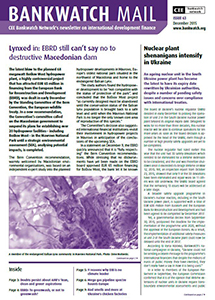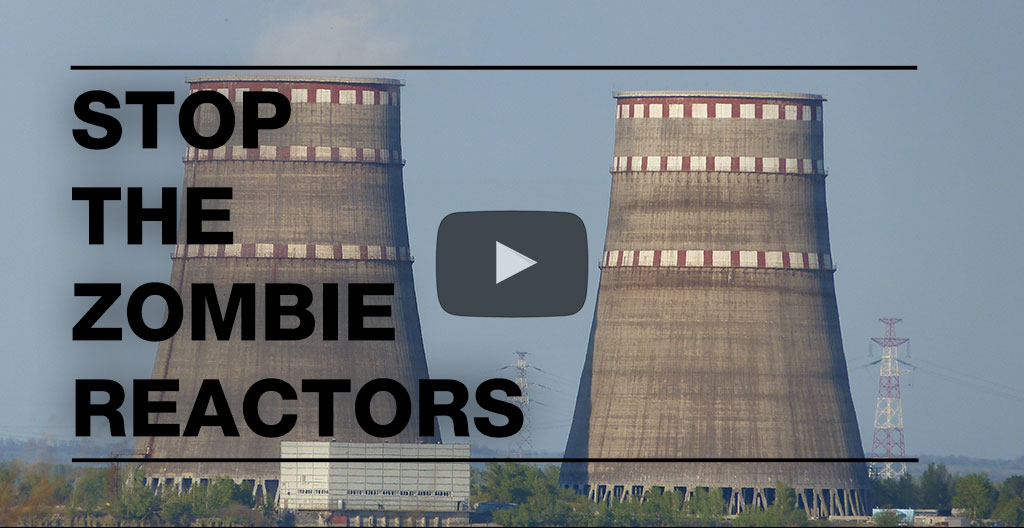Nuclear plant shenanigans intensify in Ukraine

Bankwatch Mail | 17 December 2015
An ageing nuclear unit in the South Ukraine power plant has become the latest to have its expiry date rewritten by Ukrainian authorities, despite a number of pending safety issues and concerns over compliance with international treaties.
This article is from Issue 63 of our quarterly newsletter Bankwatch Mail
Browse all articles on the right
The board of Ukraine’s nuclear regulator SNRIU decided in early December to prolong the operation of unit 2 in the South Ukraine nuclear power plant beyond its original expiry date. Designed to work for no more than three decades, this nuclear reactor will be able to continue operations for ten more years as soon as the board decision is approved by the head of the SNRIU, even though a number of high priority safety upgrades are yet to be completed.
The nuclear regulator had ruled earlier this year that the unit had 33 safety deviations which needed to be eliminated for a lifetime extension to be considered, and the unit was therefore shutdown once it exceeded its design lifetime on May 12, 2015. Yet, an inspection report from October 23, 2015, showed that only 9 of the 33 deviations have been eliminated and repair work on 11 others was still underway. The SNRIU board agreed that the remaining 13 issues will be addressed at a later stage.
Read also
Ukraine snubs safety concerns and European donors, extends lifetime of fourth Soviet-era nuclear reactor
Press release | December , 2015
Ukrainian court backs state attempt to stifle public debate on ageing nuclear fleet
Press release | October 29, 2015
Find more background, get involved
A broader safety upgrade programme in Ukraine’s nuclear reactors, including in the South Ukraine power plant, is supported with a total of EUR 600 million from Euratom and the European Bank for Reconstruction and Development and had been agreed to be completed by December 2017.
Yet, a governmental decree from September 30, 2015, postponed the deadline for the implementation of the programme until 2020, without the approval of the European donors. As a result, the implementation of additional safety measures at unit 2 of the South Ukraine plant could now be delayed until the end of 2017.
According to Iryna Holovko, Bankwatch’s national campaigner in Ukraine, “Ukraine could not be sending a clearer message to the programme’s international financiers that despite the millions of euros of public money they have invested, they don’t really have a say in how it is being used.”
In a letter to members of the European Parliament in September, the European Commission confirmed that it is of the opinion that lifetime extensions of nuclear units in Ukraine require transboundary environmental assessments and public consultations in neighbouring countries, in line with the Espoo and Aarhus conventions. Yet, the Ukrainian authorities’ refusal to do so has not prevented the European donors from disbursing their loans.
Three other Ukrainian nuclear units are already operating beyond their design lifespan. In 2010, units 1 and 2 at the Rivne power plant were authorised to continue working until 2030. This decision has been found to be in breach of the Espoo Convention. Unit 1 at the South Ukraine power plant was also granted a ten year lifetime extension in 2013. An independent expert report published earlier this year concluded that the reactor is suffering critical vulnerabilities.
Meanwhile, the National Ecological Centre of Ukraine (NECU), Bankwatch’s Ukrainian member group, has lodged an appeal with the Kiev court of appeal contesting October’s verdict from a commercial court in Kiev which ruled in favour of a defamation lawsuit brought by the Ukrainian state against NECU and its efforts to raise attention about shortcomings in safety standards within the country’s nuclear power stations. Among other things, NECU’s appeal points out that its disputed comments were based on information contained in independent studies carried out by nuclear energy specialists. According to NECU, both expert studies were part of the October lawsuit documentation but were not considered by the court.
Find out more
Visit the campaign webpage at https://bankwatch.org/our-work/projects/nuclear-power-plant-safety-upgrades-ukraine
Theme: Energy & climate
Location: Ukraine
Project: Zombie reactors in Ukraine
Tags: SNRIU | nuclear safety
Never miss an update
We expose the risks of international public finance and bring critical updates from the ground. We believe that the billions of public money should work for people and the environment.
STAY INFORMED

